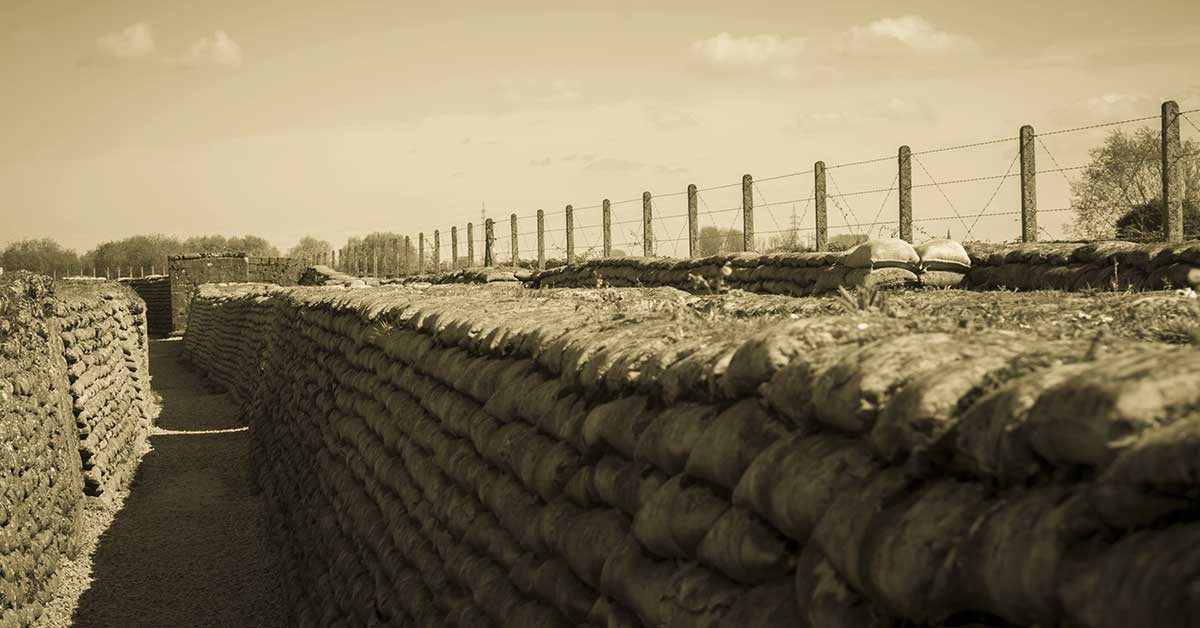As the holidays draw near, we are reflecting on one of the greatest displays of compassion on a battlefield to date: the Christmas Truce of 1914. This event was a show of true camaraderie between enemies on the battlefield on a scale we have never seen since. Many soldiers of the First World War halted their feud to gain simple moments of peace for Christmas.
In some ways, the soldiers on opposing sides had been providing each other scraps of peace in their day-to-day lives. Often, patrols would ignore each other. They found it easier to simply let the opposing patrols be, instead of living through the constant storm of fighting. The armies would even eat their meals at the same time, which gave a consistent moment of quiet among the violent warfare.
There were many conditions which led to this sweeping display of compassion between soldiers during Christmas of 1914. One of the main reasons was simply the fact that the war was already supposed to be over. Both sides had promised a swift victory that was not given. By Christmas Eve, many of the soldiers had expected to be at home. Morale was at an all time low as many soldiers – a majority of them less than 25 years old – experienced their very first Christmas away from their homes. Very simply, men all across the battlefield were missing their families. They had not expected to be away from their homes for so long.
The soldiers’ low morale did not merely stop with their homesickness. The most impactful element was the weather which dampened the soldiers’ trenches and their spirits. Rainfall had been a near constant for weeks as the armies waited out the winter. Trenches were muddy, stinky, and they would collapse, creating dangerous conditions for the soldiers.
On Christmas Eve, however, a true gift was given to the soldiers: the rain stopped. The mud began to freeze in the sudden cold dryness, and walking through the trenches abruptly became a far easier task. As snow started to fall, the rate of gunfire started to fall with it. The shift in weather had cheered the soldiers enough that some sectors halted their gunfire completely.
With this newfound sense of joy, the German side put up lit fir trees (or Tannenbäume) along the parapet. They began to sing Christmas carols. Their jovial songs drifted across No-Man’s-Land.
As the British side overheard, they sang their own Christmas songs in retaliation. However, as they kept singing, the combat between their songs transformed into a collaboration. All along the line of trenches, similar stories occurred. These soldiers acquired a brief moment of peace with their Christmas carols.
Arrangements to cease fire the next day were settled by some senior officers. In other cases, the smaller ranks simply yelled over No-Man’s-Land to the opposing side, promising to keep peace for a day if the other side promised the same. A majority of these ceasefire agreements were held through.
That Christmas Eve, for the first time in months, the soldiers were able to rest in true soundlessness.
As the sun broke over the battlefield on Christmas Day, the British troops were shocked to see Germans walking along their parapets. To be so openly vulnerable to gunfire in the light of day would generally spell out their doom. This was a very bold gesture of trust, one which drew a few of the British out of their own trenches.
Unfortunately, in the light of the day, it was also impossible to ignore the accumulation of bodies in No-Man’s-Land. Each side was finally able to collect their dead. They dug graves side by side, mourning their losses together. They even conducted memorial services together. This, more than anything, was the act that brought both sides together. They were able to find a split moment of camaraderie in their shared fallen.
Here the true truce began. Soldiers swapped gifts with each other, as both sides had received an overabundance from their governments – as Christmas gifts to boost morale – but had very little space to store them.
The soldiers spoke with each other, telling stories and small anecdotes. At this moment, they were all simply men of similar experience. They had all felt the oppressive, weeks-long rains. They were all terribly sick of war. And in some ways, the soldiers were curious as to who they were fighting. They wanted to know who their enemies were.
Throughout the lines of trenchesAlong the trench lines, men brought out footballs. Games between the enemies broke out with near-friendly competitions between the two.
Of course, this moment could not last. When commanders caught news of the events occurring down the lines, they sent senior officers to resume warfare. Some sections followed suit with officers meeting to fire a gun in the air and agree to resume. However, some forces decided to hold off until almost the new year.
The Christmas Truce of 1914 was the most far-reaching act of compassion in WWI and beyond. Soldiers from opposing sides sang together, spoke together, and played games together all in the simple spirit of the holiday season. For a day, enemies became comrades.
Today is a day to reflect upon your own “enemies” in your life and ask yourself, “Where can I put down my own guns?” If WWI combatants can do this in the midst of war, imagine what we can do in our own lives.


